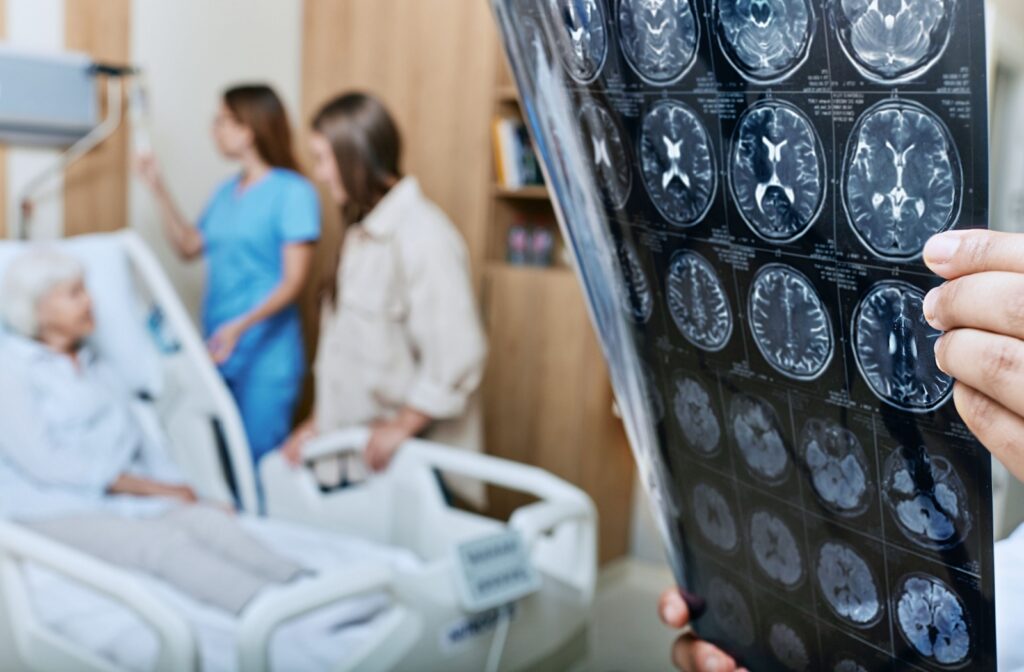When a loved one is diagnosed with dementia, it can be overwhelming to understand how the disease progresses and what to expect. Dementia, often associated with conditions such as Alzheimer’s disease, doesn’t develop overnight. Instead, it unfolds in stages, each bringing unique challenges and changes.
The seven clinical stages of dementia, based on the Global Deterioration Scale (GDS) developed by Dr. Barry Reisberg, include pre-dementia, mild dementia, moderate dementia, and severe dementia stages. We’ll explore what happens at each stage, from the earliest signs to the late stages, and discuss how caregivers and memory care professionals can provide support throughout.
What Is Dementia?
Dementia isn’t a single disease, but refers to a range of conditions characterized by cognitive decline. It impacts memory, thinking, problem-solving, and the ability to perform daily functions. Alzheimer’s disease is the most common form of dementia, but others include vascular dementia, Lewy body dementia, and frontotemporal dementia.
Signs & Symptoms of Dementia
The symptoms of dementia vary depending on the type and stage, but typical indicators may include:
- Memory loss that interferes with daily life
- Difficulty concentrating or solving problems
- Confusion about time and place
- Difficulty completing familiar tasks
- Personality or behavioral changes
It’s important to note that occasional forgetfulness doesn’t necessarily indicate dementia. For a diagnosis, there needs to be a consistent decline that impacts daily living.
Overview of Disease Progression
The Global Deterioration Scale (GDS), developed by Dr. Barry Reisberg, is a tool used worldwide to identify the progression of Alzheimer’s disease and other dementias. It classifies the disease into seven stages, from pre-dementia to severe decline. Stages 1 to 3 are considered the “pre-dementia” stages, while stages 4 to 7 correspond to progressive levels of dementia.
Here’s a breakdown of each stage.
Pre-Dementia Stages
Stage 1: Normal Outward Behavior (No Dementia)
In the first stage, there are no noticeable symptoms of dementia. Individuals function as they always have, with no signs of memory loss or cognitive decline. This stage resembles typical aging with no evident complications.
Stage 2: Very Mild Changes (No Dementia)
Slight memory lapses may occur, such as forgetting names or where an item was placed. These changes are often minor and can be mistaken for normal aging. There’s no impact on daily activities or quality of life at this stage.
Stage 3: Mild Cognitive Decline
Family and friends notice subtle changes in cognitive ability. These might include difficulty finding the right words, forgetting appointments, or struggling to focus. While individuals can still perform most daily tasks independently, this stage may raise early concerns.
Early-Stage Dementia (Mild)
Stage 4: Moderate Changes/Mild Dementia
At stage 4, cognitive decline becomes more apparent. Individuals may forget recent events, struggle with complex tasks such as financial planning, or find it challenging to organize their thoughts. While they may be physically independent, mild dementia often requires emotional or minimal practical support.
Signs to look for:
- Forgetfulness about recent events
- Difficulty performing tasks that require planning
- Trouble managing money or bills
- Withdrawal from social interactions
Middle-Stage Dementia (Moderate)
Stage 5: Moderately Severe Mental Decline/Moderate Dementia
By this stage, dementia significantly impacts daily life. Individuals may no longer remember their address or essential contact information. Assistance with activities like dressing becomes necessary, although they can recall significant events like their name or family members.
Key signs:
- Confusion about time and place
- Difficulty remembering personal history
- Requiring help with activities like dressing or meal preparation
Stage 6: Severe Mental Decline/Moderately Severe Dementia
At stage 6, the need for assistance extends to basic day-to-day tasks. Individuals may have difficulty identifying close family members, experience disruptive behavioral changes, or exhibit incontinence. At this point, full-time caregiving is often required.
Common challenges:
- Forgetting the faces of loved ones
- Worsened memory and reasoning skills
- Personality and behavioral changes (e.g., agitation or hallucinations)
Late-Stage Dementia (Severe)
Stage 7: Very Severe Mental Decline/Severe Dementia (Final Stage)
A significant loss of cognitive and physical abilities marks stage 7. Individuals typically lose the ability to speak coherently and may not respond to their environment. Basic functions such as eating or walking often require assistance, and full-time care is essential.
Symptoms include:
- Loss of speech
- Limited or no mobility
- Need for assistance with all personal care tasks
- Increased vulnerability to infections like pneumonia
Memory Care Supports Those Living with Dementia

Navigating the stages of dementia can be challenging for families, but dedicated memory care communities provide tailored support at every step. Here’s how memory care helps individuals and their families:
- Personalized Care Plans: Memory care communities design individualized plans to meet each resident’s unique needs, whether they’re in the early or late stages.
- Safe and Structured Environments: Carefully designed spaces reduce the risk of wandering and provide a calm, secure setting.
- Expert Professionals: Staff members are specially trained to provide compassionate and effective dementia care.
- Meaningful Activities: From art therapy to gentle exercises, activities are designed to engage residents and improve their quality of life.
- Family Support: Memory care extends beyond residents, offering families valuable educational resources and emotional support.
Enhancing Quality of Life at Every Stage
Understanding the seven stages of dementia provides clarity on what to expect as the disease progresses and highlights the importance of appropriate care at every level. From early planning to advanced memory care, taking a proactive approach towards a loved one’s well-being can significantly enhance their quality of life.
The Legacy of St. Michael provides compassionate memory care services tailored to each resident’s unique needs. Our dedicated team supports your loved one at every stage, helping them live with dignity and purpose. Contact us today to learn how our community can support your loved one through their dementia diagnosis.



